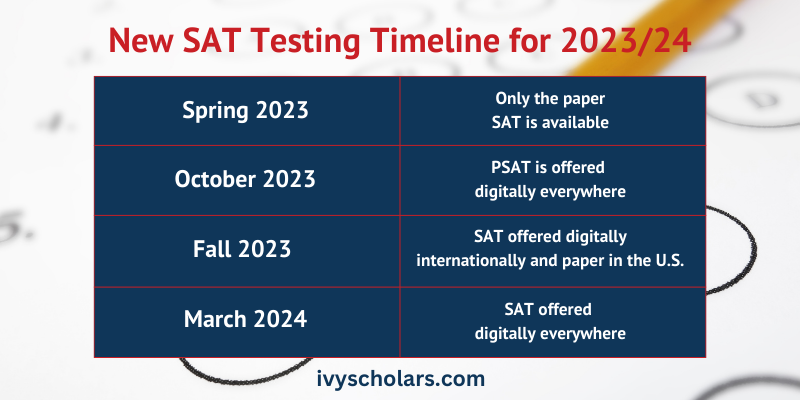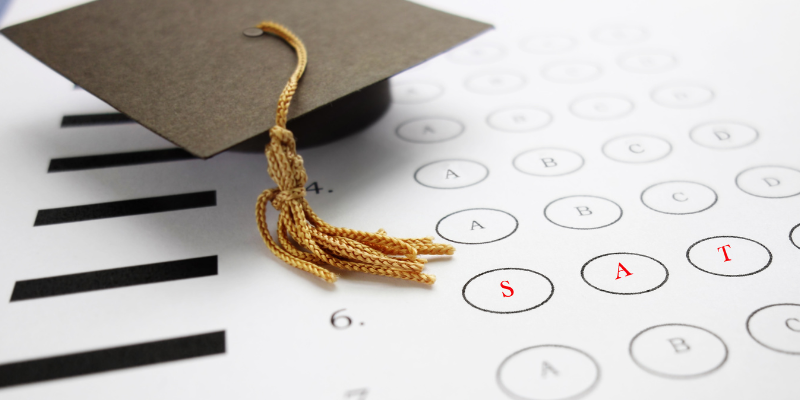College Board has announced that the SAT will be transitioning to a fully digital format in 2024, and the current paper format will no longer be offered. What is the new SAT, and how is it different from the one you see now?
In this article, we’ll break down the changes from the current format to the new digital SAT. We’ll first cover the technical changes, then content changes. Finally, we’ll go over why the SAT is making these changes. We’ll also include a timeline, so you’ll know if you can take the paper SAT, or if you will be taking the digital version. Let’s get started!
The SAT’s New Digital Format
The most noticeable difference is that the SAT will now be administered through a digital app called Bluebook. All of the other changes stem from this, and the logistical changes it affords and requires.
You are required to download the Bluebook app; they have the following list of approved devices which are allowed to be used in testing:
- Windows and Mac desktops and laptops
- School issued Chromebooks (note that personal Chromebooks are not permitted, only school-issued ones).
- IPads. IPads must have a detached keyboard.
- If the device is a laptop, you may not use a detached keyboard, but may use a detached mouse.
Your device must be able to connect to wifi. Students may use their own devices or may borrow one from their school. College Board has a program to loan out devices to students who cannot otherwise access one for this test.
The new SAT will not be offered remotely. While it is digital, it will still be administered through schools or in testing centers. You will need to bring your device with you; it should be fully charged, and you should bring a charger. To deal with technical situations, each testing center will have a tech on hand during all tests to assist and troubleshoot.
The process for registering for the SAT is unchanged. The format in testing is slightly changed, as they now allow for staggered start times and broader testing windows in schools. While this is not the case for testing centers yet, we expect it will be implemented soon.
Accommodations
In spite of the new format, the SAT will continue to offer all previous accommodations granted to students.
Students requiring accommodations which are not available digitally, such as students needing a braille test, will be given a paper test, which will more closely resemble the current SAT format. These will only be given to students needing these accommodations. The system for requesting accommodations is the same.
How Has the Digital SAT’s Content Changed?
The content for the digital SAT has been significantly updated. We’ll begin by covering changes that impact the test as a whole, then cover specific content changes to the sections. The first, and largest, change is the overall length of the test. While the current format is almost three hours in length, the digital SAT is a little over two hours long, and consists of the following sections:
- Reading and Writing Section 1, 27 questions in 34 minutes
- Reading and Writing Section 2, 27 questions in 34 minutes
- Break
- Math Section 1, 22 questions in 35 minutes
- Math Section 2, 22 questions in 35 minutes
College Board has been able to do this by making the exam adaptive. When you complete the first of the two sections, for both math and reading/writing, your performance decides what questions you are given for the next section. If you perform under a certain threshold, you are given a slightly easier set of questions for the second section.
All offered sections contain a mix of easy, medium, and hard difficulty questions; but the second section given for each portion has two forms, one with slightly easier questions, and one with slightly harder questions. This has also changed how scoring is done. Because students are not all given the same questions, scoring can no longer be done simply with the ratio of correct to wrong answers.
Instead, an algorithm assigns different weights to different questions, so getting a harder question right is worth proportionally more than getting an easy question correct. If you want to get a top score on the new digital SAT, you need to do as well as possible on the first section to ensure you have access to the second, harder section. This is the only way to get a perfect score.
College Board has also removed the experimental section, where they tested new questions. Instead, each section has two unmarked experimental questions within it, which are not scored. You have no way of knowing which these are, and they will not impact your testing.
Notably, each student taking the test will receive a slightly different version. The digital format allows College Board to have a very large pool of potential questions, ranked by difficulty, and each student has their own test generated when they download it for the first time. This is meant to improve test security, and reduce the problems caused by attempted student collaboration or test leaks.
This change also means you will not receive a copy of the questions you were asked after the test is done. Instead, most questions will be kept in the common pool, and will be reused on later tests. College Board has announced they will release four full practice tests each year, with those questions removed from circulation.
Scoring
The SAT is still scored on a scale of 200-800 for each portion, for a total score of 400-1600. College Board also intends for the scores to be contiguous, so that a score on the current SAT is the same score on the digital SAT. While their methodology will be more opaque, we do not anticipate shifts in scoring trends.
College Board has announced that scores will be available much sooner now, released in days rather than weeks. While it remains to be seen if they will be able to deliver on this, we do think the new format will allow for a faster return on scores.
Changes to Reading and Writing
The first change is the integration of the reading and writing sections. While the current paper SAT has these as separate portions, on the digital test you will be asked questions from both in the two reading and writing sections. Within each section, questions will generally progress from easier to harder. This is not a strict linear increase, but a trend. The reading questions will occupy the first half of each of the two sections, while writing questions will comprise the second half. Difficulty progresses within each portion; the writing questions are not all harder than the reading questions.
The next major change is in the passages you analyze. Currently, there are 4-5 long passages, each of which has 10-11 questions associated with it. In the new format, each question has its own short passage. The current passages are 500-750 words in length, while the new ones are 25-150 words.
There are a number of other minor changes. For writing questions, there will no longer be a “No change” answer option. Questions about graphics (such as tables and graphs) have been simplified for the new format. Finally, writing questions will no longer cover commonly confused words or idiomatic expressions, which were a source of frustration for many students who would rather not memorize hundreds or thousands of phrases.
Changes to Math
The first change is that you are now permitted to use a calculator on both sections of the math test. You may either use an approved calculator you bring in, with the same standards the SAT previously had, or you may use the built-in calculator by Desmos which is available through the Bluebook app.
You will still need to answer questions involving graphs or tables, though these may be simplified to ensure they display correctly on digital devices. As with reading passages, each image will only correspond to a single question. The test will still be a mixture between multiple choice and written answers, though it is no longer a grid-in. Finally, imaginary and complex numbers will no longer be included in questions.
Testing Timeline

Why is College Board Making the SAT Digital?
While there’s no way to answer this for certain, we are confident in saying the main impetus stems from the Covid-19 pandemic and the resulting rise in test-optional college admissions. As colleges go test-optional, College Board wants to ensure that colleges and students continue to view the SAT as a necessary component of the admissions process.
College Board gave their own reasons, namely a desire to increase the accessibility and equity of the test while reducing the stress it causes students. We do believe that the changes they have made with adaptive testing, flexibility in scheduling, and start times for school-administered tests will be a boon to many students and improve their overall performance on the test.
Further, the new format helps prevent costly repeats of past mistakes by College Board, including leaked tests or mail delays that prevented tests from being administered or caused scores to not be counted. This increase in reliability and honesty will improve the standing of the test as a whole.
Final Thoughts
The SAT as a whole is changing a lot in its newest iteration, but the idea behind the test, and College Board’s motivations for it have not changed. They want a way to evaluate high school students’ readiness for college offer a single low-stress option for doing so. While many colleges have gone test-optional, we still recommend all our students participate in standardized testing, as doing well can only help your application.
Of course, this change will impact each student differently. If you are looking to study hard and take the paper test before the change, or you want to begin preparing now for the digital version, we can help. Our test prep experts are well-versed in the SAT and can help you regardless of your aims. Schedule a free consultation to learn more – we’re always happy to hear from you!








